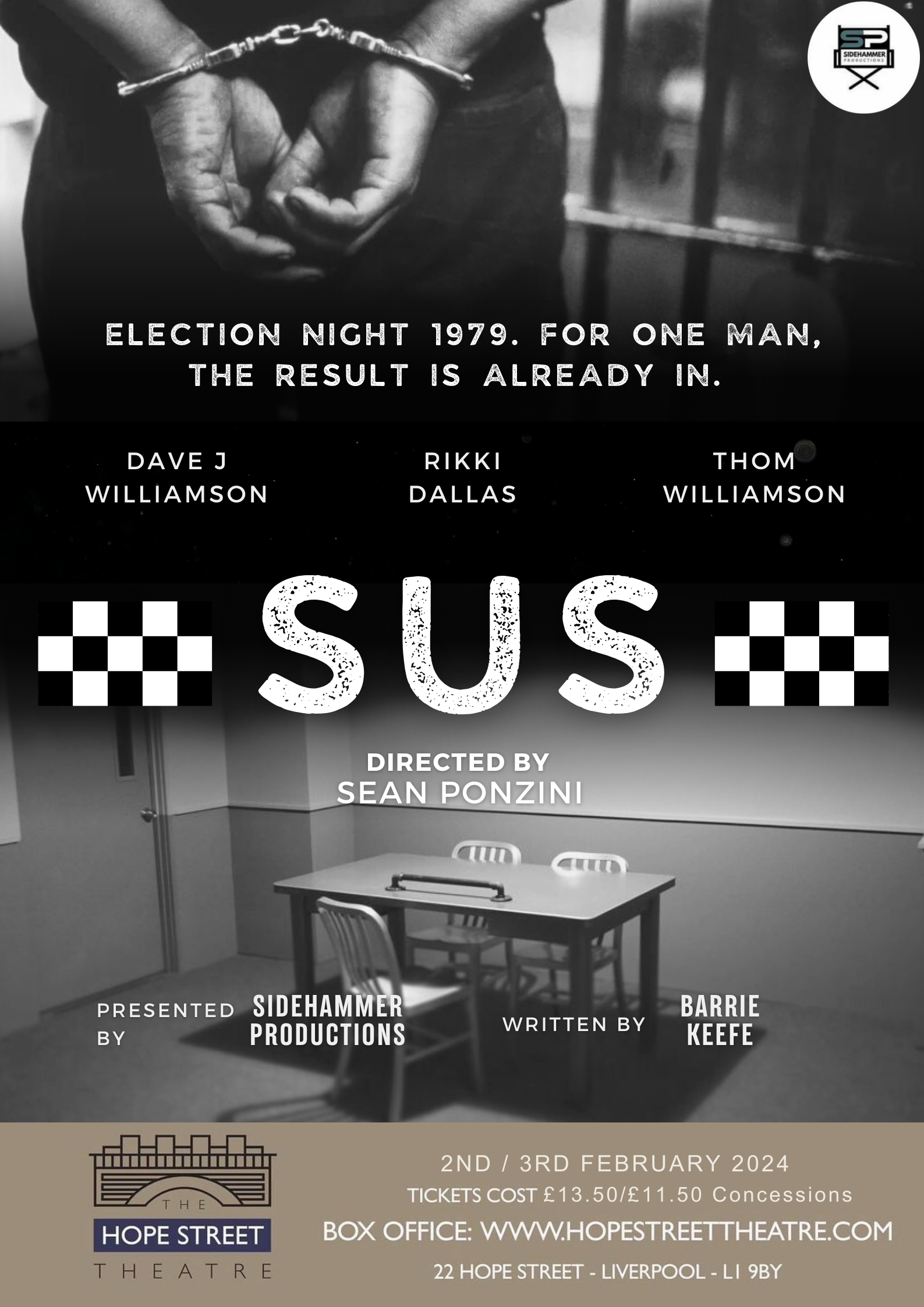Plug-In: SUS
SUS, 2nd and 3rd February 2024 at Hope Street Theatre, Liverpool
Sidehammer Productions, Written by Barrie Keefe, Directed by Sean Ponzini
David J Williamson, Rikki Dallas, Thom Williamson
If you are as old as me you may remember the SUS laws. These gave the police powers to stop and search and potentially arrest people on flimsy suspicion. Effectively it was used by institutionally racist police forces in the late 1970s and early 1980s to harass young black men and led to many wrongful arrests, antagonism, riots and protests.
Now, Barrie Keefe’s play set on election night 1979 is coming to Liverpool. The action takes place during the graveyard shift at a police station, as two detectives, embittered yet empowered by the prospect of a new right-wing government, place bets on which party will win. When a black man is arrested and accused of his wife’s murder, he is incensed, believing that he will be fodder for an incoming government keen to flex its law-and-order muscles.
The drama is a harrowing portrayal of power, politics, corruption and racism which is sadly still prevalent today. Originally performed in London shortly after Thatcher was elected, the play has since proven popular around the world, playing New York, Los Angeles, Europe and Australia and has had adaptations in Pakistan and India.
We caught up with Sledgehammer Productions, Thom Williamson who says that the show will challenge and confront the audience’s perceptions of justice, race and power.
‘The play confronts the audience with the extreme toll racism can have on the victims, and the vulnerable and dangerous positions they can find themselves in when power goes unchecked. The character of Delroy finds himself in a situation where his world has crashed down around him. At a time where he is at his most vulnerable and in need of support, he finds himself at the mercy of these twisted characters. It also challenges the audience to confront what shapes these characters to begin with. Karn and Wilby are monsters. Nasty and sadistic. However, they don’t know they are monsters. They genuinely believe Delroy is guilty. Their bigotry and sense of superiority is so ingrained in them, and they are so high on the prospect of an imminent Thatcher victory and what that means for their potential new police powers that they are salivating at the chance to make an example out of this man’.
But what is the aim of delivering this show now given the phony, lip-service, and sham ‘political correctness’ shown by many police forces anxious to show that they have cleaned up their acts until the next exposure?
Williamson explains: ‘Our aim is to present hard-hitting theatre with a social and political edge that reflects society and hopefully provokes discussion and debate for our audience. With our first show, John Dillon’s Wearing Colours, we presented a show that aimed to take on an, often taboo, subject that has real historical significance for the city of Liverpool and approach it honestly and objectively. With SUS, we are attempting to do the same with a subject and with themes that are relatable the world over. The play was originally set in an East London police station, but regrettably, the themes of prejudice, abuse of power, bullying and discrimination of any kind are identifiable anywhere in the world. In 2010 an Evening Standard review of SUS proclaimed it ‘should seem more of a period piece than it does,’ and Keefe himself once said he was 'horrified and saddened that it is still hitting a nerve.' Unfortunately, the play’s themes remain as relevant today as in 1979.
Williamson highlights the present shocking reports of racism, misogyny, homophobia and bullying in public institutions such as the Met and many of the sickening views expressed by Karn and Wilby are still being echoed in the dehumanizing rhetoric used by many politicians today’.
The drama promises to be tense and claustrophobic, based entirely within the one interview room. This allows direct focus on the characters without any distractions. The backdrop of the 1979 general election and the characters of Karn and Wilby who are invested in, and obsessed with, the ‘new dawn’ of politics and their attempts to keep abreast of the election results in real-time provide creative ways to bring the audience out of the interview room and examine certain aspects of the world these characters inhabit.
Written by, Bob Towers

